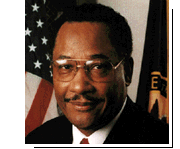
|


|


Lee P. Brown served as President Clinton's first director of the White House Office of National Drug Control Policy, leaving the post in January 1996. He was New York City police commissioner from 1992 to 1993, capping a 32-year career in law enforcement. He is now professor of sociology at Rice University in Houston. His interview with FRONTLINE was conducted in April 1997.
|

|
To what extent was heroin production on your radar screen when you were the drug policy director?

|

I was very much concerned about heroin. What we saw happening in this country was the fact that we saw more heroin on the streets of our cities throughout America. The purity was high. The price was low.
|

|
And what about Burma in particular?

|

From my perspective I was very much concerned about how do we engage them in some meaningful way to help address the drug problem, such as our drug enforcement people exchanging information with them or, where appropriate, maybe providing some training for their enforcement personnel.
|

|
Was Burma a particular frustration?

|

There's a frustration. I went to Thailand and stood on the border of Thailand and Burma. And you can see the armed camps in the mountains. They are in civil war there, and that makes it much more complex to resolve a problem, because of their internal turmoil.
|

|
What about a regional strategy to pressure the Burmese?

|

A major policy decision that I presented to the President, which he accepted, was to approach it from a regional standpoint. How can the other countries in the region work, probably in a better way than our government can, in dealing with Burma in addressing the drug problem - Thailand, Vietnam, Laos and China?
|

|
Was the regional strategy successful?

|

It's an ongoing process. We're not going to find anything that's going to solve this problem overnight.
|

|
Burmese production has nonetheless continued to increase in recent years?

|

Part of the problem that we have is we don't have diplomatic relationships with Burma. For example, as a cabinet member, I could not travel to Burma. Isolation is not going to solve our problem. What we're going to have to do is engage Burma in some meaningful way and take into consideration the best interests of this country in both arenas: one being the human rights violations and, second, in my estimation equally important, the heroin problem.
|

|
If you were successful in cutting off Burma's heroin supply, would it not simply mean that another country would jump in to satisfy the demand?

|

I'm not operating under any illusion that we will ever stop the growth of the opium poppy that can be cultivated and be made into heroin. We're seeing an increasing amount of heroin that we seize on the streets of the United States coming out of Latin America right now. I'm not saying, however, that if we stopped it in Burma, another country would take over. What I'm saying is the best way to deal with the problem is not to use it. If we didn't use it in this country, it would be futile for the other countries to grow and try to satisfy a demand that does not exist.
|

|
What about making U.S. trade a condition of the Burmese government's crackdown on heroin?

|

It's not as simple as saying that we won't trade with Burma. I don't think we're doing any trading with Burma.
|

|
So you see this as a complex, long-term problem without any easy solutions?

|

What we have to have is a long-term goal - I suggest a couple of decades - with sustained effort and, most important, sustained funding from the Congress, if we're going to make progress. We have to have a commitment in terms of doing what we have to do internationally, a commitment to do what we have to do domestically, particularly in reducing the demand for drugs.
|

|
You seem pessimistic on the supply side - that is, in the prospects for reducing the output in countries like Burma?

|

I don't see it happening overnight. I think we have to have a long-term commitment in terms of both a strategy and finances. What I'm saying is we have to have a comprehensive approach. Law enforcement, yes. Eradication, yes. Crop substitution, yes. Sustained economic development, yes. All of that has to be part and parcel of addressing the problem.
|

|
|
home | interviews | how can we crack down? | maps & charts | transforming poppies to heroin | heroin in the brain | opium throughout history | viewer reactions | press | tapes & transcripts | explore FRONTLINE | pbs online | wgbh
New Content Copyright © 1998 PBS and WGBH/Frontline

|